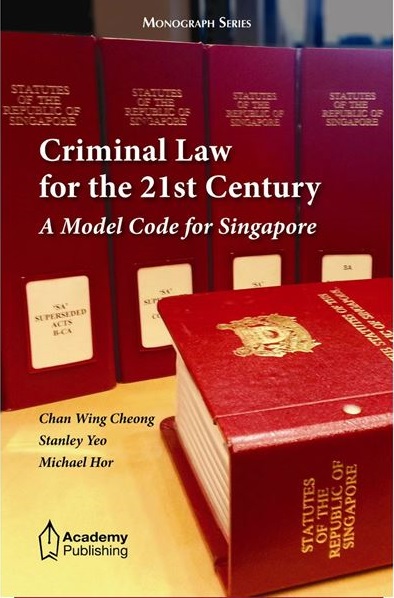In this book, the authors propose a set of improved and modernised provisions expressing the general principles of criminal responsibility. This set of principles will comprise a “General Part” which, it is proposed, will form part of Singapore’s Penal Code. The key objective of devising and enacting the General Part is to significantly revitalise the Penal Code and restore many of its original technical attributes. Each chapter of this book comprises: (a) a carefully considered and drafted provision on a general principle of criminal responsibility; (b) a summary of the existing law in Singapore pertaining to that principle; (c) a selection of recent formulations of that principle from other jurisdictions to benchmark Singapore’s law (both current and proposed) with international best practices; and (d) a comparison of these formulations with the provision proposed in this book for inclusion as a General Part in Singapore’s Penal Code.
Contents
Chapter I Introduction
By Stanley Yeo
PART 1 Purpose and Application
By Stanley Yeo
Chapter 1.1 Purpose and Application
PART 2 Proof of Criminal Responsibility and Establishing Guilt
By Michael Hor
Chapter 2.1 Burden of Proof
Chapter 2.2 Principle of Concurrence between the Fault and Physical Elements of a Crime
PART 3 External Elements of Offences
By Chan Wing Cheong
Chapter 3.1 Physical Elements
Chapter 3.2 Voluntariness
Chapter 3.3 Omissions
Chapter 3.4 Causation
PART 4 Fault Elements of Offences
By Chan Wing Cheong
Chapter 4.1 Fault Elements
Chapter 4.2 Transferred Fault and Defences
Chapter 4.3 Offences without Specific Fault Elements
Chapter 4.4 Corporate Criminal Liability
PART 5 Offences Which Do Not Require Fault
By Chan Wing Cheong
Chapter 5.1 Strict Liability
Chapter 5.2 Absolute Liability
PART 6 Extensions of Criminal Responsibility
By Michael Hor
Chapter 6.1 Abetment, Conspiracy and Group Liability
Chapter 6.2 Attempt
PART 7 Defences
By Stanley Yeo
Chapter 7.1 Children
Chapter 7.2 Mental Impairment
Chapter 7.3 Involuntary Intoxication
Chapter 7.4 Voluntary Intoxication
Chapter 7.5 Mistake or Ignorance of Fact
Chapter 7.6 Mistake or Ignorance of Law
Chapter 7.7 Private Defence
Chapter 7.8 Duress
Chapter 7.9 Necessity
Appendix Penal Code (General Part) Act
Author(s)/Editor(s)/Contributor(s):
Chan Wing Cheong is an associate professor of law and Amaladass Fellow at the National University of Singapore. He specialises in criminal law and family law, and has written extensively in these areas.
Stanley Yeo is a professor of law at the National University of Singapore. He is an internationally-renowned comparative law scholar who has studied the criminal laws of various jurisdictions for three decades. He has authored several books on the Indian/Singapore Penal Code.
Michael Hor is a professor of law at the National University of Singapore. He has researched, published and taught criminal law and criminal evidence and process for more than two decades.
All three authors are regularly consulted by both the Singapore Ministry of Law and the Criminal Practice Committee of the Law Society of Singapore on matters concerning criminal law reform.
Delivery
Specification
|
Publication Type: |
Books |
|
CS Redeemable: |
Yes |
|
Date of Publication: |
Jul 2013 |
|
ISBN Code: |
978-981-07-6799-0 |
|
Depth: |
2.00000 |
|
Width: |
15.00000 |
|
Height: |
24.00000 |
|
Shipping to SG: |
FREE |
|
Price(SGD): |
85.60 |
|
Weight: |
0.70000 |













